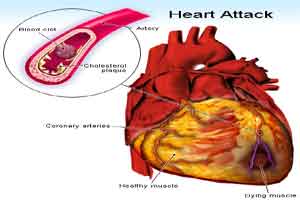- Home
- Editorial
- News
- Practice Guidelines
- Anesthesiology Guidelines
- Cancer Guidelines
- Cardiac Sciences Guidelines
- Critical Care Guidelines
- Dentistry Guidelines
- Dermatology Guidelines
- Diabetes and Endo Guidelines
- Diagnostics Guidelines
- ENT Guidelines
- Featured Practice Guidelines
- Gastroenterology Guidelines
- Geriatrics Guidelines
- Medicine Guidelines
- Nephrology Guidelines
- Neurosciences Guidelines
- Obs and Gynae Guidelines
- Ophthalmology Guidelines
- Orthopaedics Guidelines
- Paediatrics Guidelines
- Psychiatry Guidelines
- Pulmonology Guidelines
- Radiology Guidelines
- Surgery Guidelines
- Urology Guidelines
Women more likely to die in the first year after MI

Heart attacks pose a greater threat to women than to men. A team at the Technical University of Munich (TUM) has determined that in the first year after a heart attack women are subject to a significantly higher mortality risk than men with similar case histories. The scientists are urging doctors to provide intensive support to female heart attack patients, above all in the first 365 days after the event.
Heart attacks are still seen as a disease that primarily affects men. That is true in the sense that men account for around two-thirds of patients hospitalized after suffering a heart attack. Studies in recent years have shown, however, that women have a higher incidence of death from heart attacks and their consequences. One reason for this is that women suffer "different" heart attacks: Statistically, they tend to be 10 years older at the time of the infarct and are more likely to have accompanying conditions such as diabetes. Moreover, it is less common for heart attacks in women to be triggered by a local narrowing of blood vessels that can be widened relatively easily.
Instead they suffer more often from diffuse coronary artery disease. In these cases, local ablation procedures have less chance of success. Dr. Romy Ubrich, the first author of the paper, explains the approach: "We wanted to find out whether the mortality risk of female patients after a heart attack is still higher after adjusting for those factors." The research drew on patient data collected in two studies ("ISAR-RISK" and "ART") with a total of 4,100 participants.
Risk elevated by a factor of 1.5
"If we look at the full five-year investigation period after the heart attack, there are no unusually large gender-specific differences if we adjust for factors such as age, accompanying conditions and type of treatment," says Romy Ubrich. "But we were surprised by the data for the first 365 days after the event: During that time, women were 1.5 times as likely to die as men."
There are a number of possible reasons for this. The last author of the study, Prof. Georg Schmidt, a cardiologist at the internal medicine unit at TUM's university hospital Rechts der Isar, believes that societal and psychological causes play an important role. "In everyday life, women often face different expectations after a heart attack than men. They are expected to start 'functioning' again sooner, which means that they are subject to bigger stresses," says Georg Schmidt. Another important factor is the prevalence of depressive conditions. Studies have shown that such conditions are not only dangerous in themselves but are also a risk factor in combination with other illnesses.
Special care in the first year
The studies providing the data for the current investigation did not cover psycho-social factors, however. Future studies would have to consider whether they represent the main cause of the differences, or whether there are other reasons, possibly biological in nature, says Georg Schmidt. In any case, he says, the spotlight now shifts to the doctors of women recovering from heart attacks: "Our study shows that it is important to pay close attention to female patients especially in the first year after the event."
Prof. Schmidt hopes that the message reaches family medicine practices in particular: "Family doctors have to be keenly aware of the social situation of these women and try to provide support. Particularly when there are signs of depression, family doctors need to be especially alert. If such indications are observed, it is important to refer the patients quickly to specialists so that they can start working with a therapist as soon as possible if needed."

Disclaimer: This site is primarily intended for healthcare professionals. Any content/information on this website does not replace the advice of medical and/or health professionals and should not be construed as medical/diagnostic advice/endorsement or prescription. Use of this site is subject to our terms of use, privacy policy, advertisement policy. © 2020 Minerva Medical Treatment Pvt Ltd